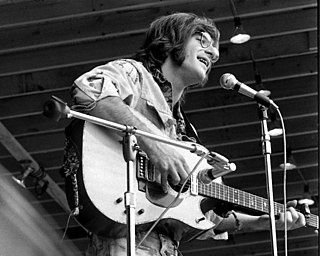
John Benson Sebastian is an American singer, songwriter and musician who founded the rock band the Lovin' Spoonful. He made an impromptu appearance at the Woodstock festival in 1969 and scored a U.S. No. 1 hit in 1976 with "Welcome Back."

The Lovin' Spoonful is an American folk rock band formed in Greenwich Village, New York City, in 1964. The band was among the most popular groups in the United States for a short period in the mid-1960s and their music and image influenced many of the contemporary rock acts of their era. Beginning in July 1965 with their debut single "Do You Believe in Magic", the band had seven consecutive singles reach the Top Ten of the U.S. charts in the eighteen months that followed, including the number two hits "Daydream" and "Did You Ever Have to Make Up Your Mind?" and the chart-topping "Summer in the City".

MGM Records was a record label founded by the Metro-Goldwyn-Mayer film studio in 1946 for the purpose of releasing soundtrack recordings of their musical films. It transitioned into a pop music label that continued into the 1970s. The company also released soundtrack albums of the music for some of their non-musical films as well, and on rare occasions, cast albums of off-Broadway musicals such as The Fantasticks and the 1954 revival of The Threepenny Opera. In one instance, MGM Records released the highly successful soundtrack album of a film made by another studio, Columbia Pictures's Born Free (1966).

Buddah Records was an American record label founded in 1967 in New York City. The label was born out of Kama Sutra Records, an MGM Records-distributed label, which remained a key imprint following Buddah's founding. Buddah handled a variety of music genres, including bubblegum pop, folk rock (Melanie), experimental music, and soul.
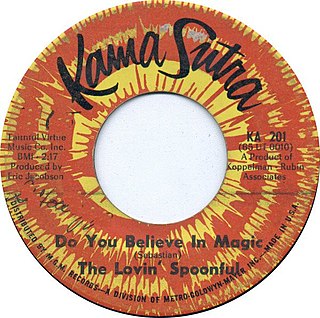
"Do You Believe in Magic" is a song by American rock band the Lovin' Spoonful, written by John Sebastian in 1965. The single peaked at number 9 on the Billboard Hot 100 chart. In 1978, Shaun Cassidy reached the Top 40 with his cover version.
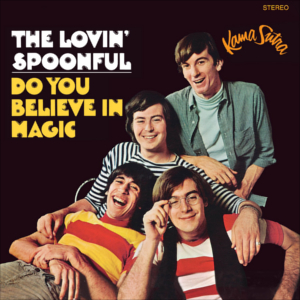
Do You Believe in Magic is the debut album by the folk rock group the Lovin' Spoonful. It was released in the United States in November 1965, on the Kama Sutra label. Released in the United Kingdom followed in March 1966. The album features the hits "Do You Believe in Magic" and "Did You Ever Have to Make Up Your Mind?".

"Summer in the City" is a song by the American folk rock band the Lovin' Spoonful. Written by John Sebastian, Mark Sebastian and Steve Boone, the song was released as a non-album single in July 1966 and was included on the album Hums of the Lovin' Spoonful later that year. The single was the Lovin' Spoonful's fifth to break the top ten in the United States and their only to reach No. 1. A departure from the band's lighter sound, the recording features a harder rock style. The lyrics differ from most songs about the summer by lamenting the heat, contrasting the unpleasant warmth and noise of the daytime with the relief offered by the cool night, which allows for the nightlife to begin.

Hums of the Lovin' Spoonful is the third studio album and fourth overall by American folk rock band the Lovin' Spoonful, released in 1966 by Kama Sutra Records. It peaked at No. 14 on the Billboard Pop Albums chart.

What's Shakin' is a compilation album released by Elektra Records in May 1966. It features the earliest studio recordings by the Lovin' Spoonful and the Paul Butterfield Blues Band, as well as the only released recordings by the ad hoc studio group Eric Clapton and the Powerhouse, until they were reissued years later.
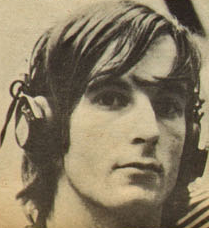
Steve Boone is an American bass guitarist and music producer, best-known as a member of the American folk-rock group the Lovin' Spoonful. Steve co-wrote two of the groups' biggest hits, "You Didn't Have to Be So Nice" and "Summer in the City".

The Lovin' Spoonful Anthology is a compilation album by the folk rock group the Lovin' Spoonful, released in 1990.

The Very Best of the Lovin' Spoonful is a compilation album by the Lovin' Spoonful, containing hits spanning their career through the 1960s and the 1970s released in 1970.

The Best of the Lovin' Spoonful is a 1967 compilation album by the Lovin' Spoonful featuring hits and other tracks from their first three albums. It charted the highest of the group's career, hitting number three on the Billboard Top LPs chart.

If I Were a Carpenter is an album by American singer Bobby Darin, released in 1966. It was a significant change in direction for Darin considering his previous album was a collection of show tunes.
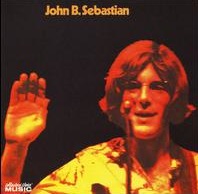
John B. Sebastian is the debut album by American singer-songwriter John Sebastian, previously best known as the co-founder and primary singer-songwriter of the 1960s folk-rock band the Lovin' Spoonful. The album, released in January 1970, includes several songs that would become staples of Sebastian's live performances during the early and mid-1970s. Most notably, the album included "She's a Lady", Sebastian's first solo single, and an alternate version of "I Had a Dream" which was used to open the soundtrack album of the 1970 documentary film Woodstock. John B. Sebastian also featured support performances by David Crosby, Stephen Stills and Graham Nash several months before that trio agreed to work together as a performing unit.
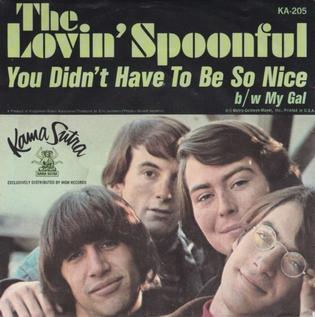
"You Didn't Have to Be So Nice" is a song by American rock band the Lovin' Spoonful. It was issued on a non-album single in November 1965 and reached number 10 on the Billboard Hot 100 in January 1966. The song was later included the band's March 1966 album Daydream. According to its writer, band bassist and songwriter Steven Boone, it was inspired by 1960s celebrity photographer Nurit Wilde.

"Darling Be Home Soon" is a song written by John Sebastian of the Lovin' Spoonful for the soundtrack of the 1966 Francis Ford Coppola film You're a Big Boy Now. It appeared on the Lovin' Spoonful's 1967 soundtrack album You're a Big Boy Now. Sebastian performed his composition at Woodstock; it was the fourth song out of the five he performed at the 1969 music festival in White Lake, New York.

The Lovin' Spoonful Greatest Hits is a compilation album by the folk rock group the Lovin' Spoonful, released on Buddha Records on February 22, 2000. The album contains every Top 40 hit single enjoyed by the band in the United States including its only chart-topper, "Summer in the City." The original recordings were produced by Erik Jacobsen, and originally released on Kama Sutra Records.

The Lovin' Spoonful is an American folk rock band which was originally active between 1964 and 1968. During their original tenure, they released five studio albums, two soundtrack albums, four compilation albums and fourteen singles in the United States. Beginning with the release of their debut single, "Do You Believe in Magic", in July 1965, the band had seven consecutive singles reach the Top Ten of the U.S. charts in the eighteen months that followed, including the number two hits "Daydream" and "Did You Ever Have to Make Up Your Mind?" and the chart-topping "Summer in the City".

"Rain on the Roof" is a song by the American folk rock band the Lovin' Spoonful. Written by John Sebastian, the song was released as a single in October 1966 and was included on the album Hums of the Lovin' Spoonful the following month. The song reached number ten on the Billboard Hot 100 chart, making it the Lovin' Spoonful's sixth consecutive single to reach the top ten in the United States.




















